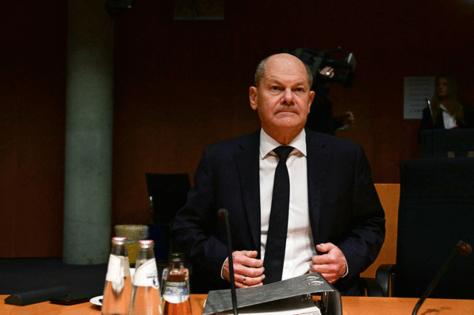Ukraine slams Scholz's call to Putin as allies question German move
Published in News & Features
Ukraine blasted Olaf Scholz’s telephone diplomacy with Vladimir Putin, as many of Kyiv’s allies took a dim view of the German chancellor’s phone call with the Russian president.
Germany said the hourlong call on Friday was aimed at urging the Kremlin leader to enter talks to end his war on Ukraine. But the first direct communication between Scholz and Putin in almost two years marked a shift from allied efforts to isolate the Russian leader since his invasion and drew quick criticism.
“This is exactly what Putin has wanted for a long time,” Ukrainian President Volodymyr Zelenskyy said in a video address to the nation on Friday. “It is extremely important for him to decrease his isolation, the isolation of Russia, and conduct the usual negotiations that will end in nothing.”
The move comes at a critical moment for Kyiv, which is bracing for another winter under attack from Russia with large parts of the country’s energy infrastructure damaged or destroyed. The impending return to the White House of Donald Trump, who has questioned support for Ukraine, has deepened doubts about whether allied backing for Kyiv may fade.
Trump’s election will mean “the war will end quicker,” Zelenskyy said in an interview with the Suspilne website released Friday.
Scholz’s renewed effort may align with Trump’s repeated pledge to end the conflict quickly – the president-elect has said he could resolve the war by his Jan. 20 inauguration. In an interview with Germany’s Sueddeutsche Zeitung newspaper, Scholz said that after a phone call with the president-elect, he came away with the impression that Trump has a “more nuanced position” on Ukraine that most expect of him in Germany.
Scholz, who is politically hobbled after his governing coalition collapsed last week, will have the opportunity to explain his decision to Group of 20 leaders gathering in Brazil.
“The chancellor called on Russia to show willingness to negotiate with Ukraine with the aim of a just and lasting peace,” Scholz’s spokesman, Steffen Hebestreit, said in a statement on Friday.
Scholz denounced Moscow’s air attacks on civilian infrastructure and called the deployment of North Korean troops a grave escalation in the more than two-and-a-half year war, according to officials in Berlin who spoke on condition of anonymity.
Scholz and Putin agreed to remain in contact, the officials said. The phone call was first reported by Bloomberg News on Friday.
But the diplomatic foray irked European Union allies who have long seen direct talks with Putin as a largely meaningless exercise. Friday’s exchange wasn’t flagged to a majority of member states, according to an EU official.
Scholz had discussed a potential call with leaders of the U.S., U.K. and France, but the timing of such a move wasn’t clear, an official close to French President Emmanuel Macron said. Macron’s efforts to maintain an open line with the Kremlin in the first months of the war fell flat — and also angered Kyiv.
One European government official derided Scholz’s move as useless. An official from another government said the chancellor is acting from a position of weakness and suggested he would be better off dealing with his domestic travails.
Another European official expressed incomprehension at the diplomatic move – and questioned the value of such a conversation by a leader who may not be in office in a few months. All spoke on condition of anonymity.
Scholz informed Zelenskyy of his plan during a conversation on Wednesday, but the Ukrainian leader responded that such a move would only play into Putin’s hands and urged him not to do it, according to a person familiar with the conversation.
Polish Prime Minister Donald Tusk, long a vocal opponent of Putin, welcomed the German leader’s criticism of Russia’s war aims after Scholz briefed him on the call.
“I was satisfied to hear that he not only condemned the Russian aggression, but he also reiterated the Polish position: ‘Nothing about Ukraine without Ukraine,’” he said in a post on X.
The Kremlin confirmed the exchange, saying in a statement that Putin noted that Russia “has never refused and remains open” to talks. But any agreement must take into account Russia’s security interests, including “new territorial realities,” it said in a statement.
The Russian statement called the conversation “detailed and frank,” with Putin reinforcing his position that the crisis resulted from NATO’s “aggressive policy.”
Germany is Ukraine’s second-biggest supporter after the U.S. and has pledged billions of euros in additional aid. Scholz this year signaled his readiness to make direct contact with Putin for the first time since December 2022, ahead of the Brazil G-20. But he stressed that he would liaise closely with the US and European allies ahead of any such phone call.
Scholz’s political leverage is undermined by his travails at home — and a Feb. 23 snap election as he trails in the polls.
In an address to parliament Wednesday, Scholz assured lawmakers that his outgoing administration would stand by its commitment to Ukraine — even as he reinforced his rejection of delivering long-range weapons such as Taurus cruise missiles, a decision that’s been criticized by other allies of Ukraine.
_____
(With assistance from Samy Adghirni, Andrea Palasciano and Milda Seputyte.)
©2024 Bloomberg L.P. Visit bloomberg.com. Distributed by Tribune Content Agency, LLC.







Comments